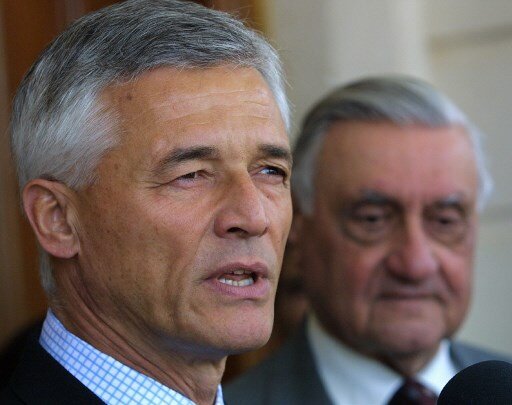Brazilian diplomat Sergio Vieira de Mello is still remembered today as the “quintessential humanitarian activist” by Bohdan Nahaylo, journalist and former United Nations High Commissioner for Refugees staff member.
“Charismatic, good looking, and a sophisticated diplomat, everybody expected he would be Secretary General of the United Nations,” Nahaylo said during an online discussion about Vieira de Mello hosted by UNHCR Ukraine and the Kyiv Post, 17 years after the diplomat was killed in the bombing of the UN office in Baghdad in 2003.
At the time of his death, he was special representative of the UN Secretary General in Iraq after serving as High Commissioner for Human Rights in Geneva, Switzerland.
He is remembered by UNHCR members as a “people-driven diplomat.”
“He understood the vibes and could lead a discussion without dominating his counterpart,” said Mridula Gosh, who was his translator when Vieira de Mello went to Ukraine in 1995.
Work in Ukraine
Vieira de Mello came to the country the same year, when he was heading a multilateral initiative called the CIS Conference process with most of the post-Soviet countries, to formulate a coherent policy among the new states.
He came to Ukraine to help with the reintegration of the Crimean Tatars, on the sideline of the conference, Nahaylo said.
An estimated 200,000 Crimean Tatars had been deported in 1944 by Joseph Stalin, an event relegated to history in the 1990s as contemporary conflicts raged in the Balkans and South Caucasus.
Ukraine had no refugee policy whatsoever, but Vieira de Mello realized the importance of Ukraine and Crimea and met with top officials and others to solve the issue.
“Ukraine was not at the top at the agenda, but he knew it had to be solved,” Nahaylo said.
As a result, Vieira de Mello gave the greenlight to the UNHCR office in Kyiv, which celebrates its 25th year in 2020. Vieira de Mello managed to make Ukraine accept Crimean Tatars, thanks to his lucid vision and unconventional manners.
“He did not always play by the book, but he got the results,” Nahaylo said.

Sergio Vieira de Mello (L), UN special representative for Iraq, talks to the press in 2003. The life of the Brazilian diplomat, killed in a Baghdad bomb blast with more than 20 colleagues on Aug. 19, 2003, has inspired two movies about him entitled “Sergio” as well as a 2008 book by ex-U.S. Ambassador to the United Nations Samantha Power. (AFP)
Talk to the other side
Vieira de Mello’s philosophy of talking to every side of a conflict is especially intriguing in Ukraine today, where Russia’s war in the Donbas has already killed more than 14,000 people and displaced 1.5 million others, said Pablo Mateu, the UNHCR representative in Ukraine.
“We have to sit down with both sides and people need to understand why we do that,” Mateu said, “even when we are not received with open arms.”
This ability to relate to all sides of a conflict made Vieira de Mello an exceptional diplomat, Maki Shinohara, a humanitarian worker and former UNHCR representative in Kyrgyzstan who worked with him, recalled.
She remembered the difficulty of the CIS Conference that Vieira de Mello headed, and how hard it was for so many states to find some common agreements.
While the conference was coming to an end, and threatening to go sour, Vieira de Mello managed to sum up every opinion without angering anyone during his concluding speech.
“Sergio was here, respecting everybody’s opinion but softly pushed the main agenda forward,” she said.
That was a lesson she remembered five years after his death, when she went to Iraq in 2008.
Back then, she had the opportunity to “meet Sergio’s ghost.” Embedded with U.S. Marines in Mosul despite her colleagues’ fear for her safety, she stopped to talk to an Iraqi citizen.
She thought he was upset because she was with U.S. troops, but he answered: “The problem is not that you’re with Americans, it’s that the U.N. is not here.”
The U.N. had to close their office after the terrorist bombing that killed Vieira de Mello and 21 of his colleagues.
While talking on the side of the road, she remembered Vieira de Mello’s motto: “You have to talk to people, never assume what they want.”
“That’s the core of what Sergio did,” she said.
Watch the Kyiv Post/UNHCR Ukraine webinar: “The incredible story of Sergio Vieira de Mello: Ukraine chapter.” It was held in Kyiv Post offices.
What would Sergio do?
Vieira de Mello’s core philosophy is still in the mind of the young generation of diplomats, Brazilian external relations officer for the UNHCR Hugo Reichenberger said.
“He really tried to learn the language, and for him, the briefing of the driver at the airport was the most important you could get,” he said.
Despite working in the same countries of Africa and South Asia, Reichenberger never met him, but Vieira de Mello’s work taught Reichenberger valuable lessons in the humanitarian field.
Whether it is a cleaning lady or a war criminal, treating everyone with dignity and respect helps you understand the situation, Reichenberger said.
And most importantly, while working on the field, Reichenberger said he keeps asking himself: “What would Sergio do?”
